Obama’s State-Level Job Approval Polls And The 2012 Election
A new set of polls from Gallup show that President Obama is still looking good for re-election.
While everyone pays attention to the national job approval or head-to-head polls that pollsters put out on a regular basis, when it comes to running for re-election in 2012, what’s really going to matter to President Obama and his eventual opponent is, of course, the Electoral College. In an effort to see where things stand in that regard, Gallup has just released a state-by-state breakdown of the President’s job approval numbers and the picture looks grim but by no means un-winnable:
PRINCETON, NJ — Residents of Hawaii gave native son President Barack Obama the highest average 2010 job approval rating (66%) of any of the 50 states, surpassed only by the 84% Obama received in the District of Columbia. Obama’s lowest average state approval rating in 2010 was 28% in Wyoming.
Half of the 10 most approving states in 2010 were located in the Northeast: New York, Delaware, Massachusetts, Rhode Island, and Connecticut. Three exceptions were Maryland, California, and Obama’s home state of Illinois. All of these states tilt significantly more Democratic in terms of political party identification than the national average.
Five of the 10 least approving states in 2010 were in the West: Wyoming, Idaho, Utah, Alaska, and Montana. The other least approving states were mostly in the middle of the country, including Oklahoma, Kentucky, Arkansas, and Kansas.
Those ten “most-approving” states would constitute 135 of the 270 Electoral Votes that the President would need to be re-elected, while the ten “least approving states” they would add up to 46 Electoral Votes. Obama’s advantage here is due largely to the presence of California and its 55 Electoral Votes.
Gallup continues:
Obama’s overall average approval rating in 2010 was 47%, down 11 percentage points from the 58% he recorded in his first calendar year in office. For purposes of this state-by-state analysis, Obama’s average is calculated for the calendar year, and is therefore slightly different than the yearly average calculated beginning with his inauguration on January 20, 2009.
Broadly speaking, residents of 20 states gave Obama an approval rating within three percentage points of his national average (between 43.8% and 49.8%). Twelve states plus the District of Columbia had average approval ratings above that range, and in 18 states, approval fell below it.
Here’s the map:
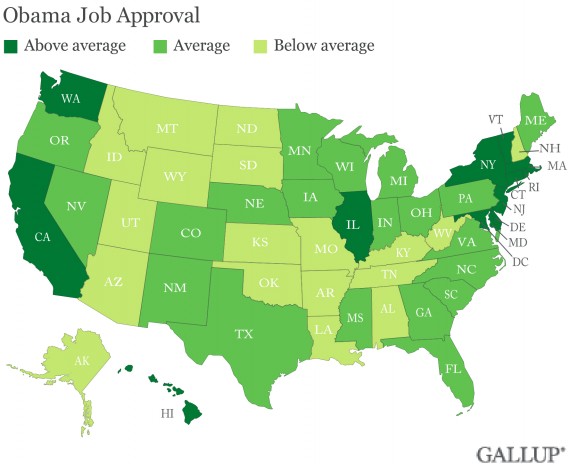 The Electoral Vote breakdown works out like this:
The Electoral Vote breakdown works out like this:
- The states where the President’s job approval rating is above average constitute 259 Electoral Votes. However, one of those states (Mississippi, 6 EVs) is one that he’s not likely to win, and another (Ohio, 18 EVs) is likely to be a battleground state in 2012.
- The states where the President’s job approval is below average constitute 279 Electoral Votes. However many of these states include ones that Obama won in 2008.
- The states where the President’s job approval is +/- 3 percentage points of the average (which overlaps to some degree with both of the above lists) constitutes 259 Electoral Votes
So basically appears that, while there are some areas of concern — being below average in states like Virginia, North Carolina, Florida, Pennsylvania, and Indiana all of which he won in 2008, for example — the President is still in relatively good shape, especially given the state of the economy. The other thing to keep in mind is that these poll numbers don’t reflect a head-to-head matchup against a prospective GOP candidate and, for the moment at least, the only candidate that seems to be able to beat Obama in the polls is Mike Huckabee, who might night even run for President this time around. Much will depend on both the state of the economy between now and election day, and who the GOP ultimately nominates. Right now, the economy seems to be improving a little bit, and the GOP doesn’t seem to know who it wants as its standard bearer in 2012.
Since 1868, incumbent Presidents have been re-elected 15 of 22 times they’ve stood for re-election. The only losses were Grover Cleveland (1888), Benjamin Harrison (1892), William Howard Taft (1912), Herbert Hoover (1932), Gerald Ford (1976) Jimmy Carter (1980), George H.W. Bush (1992). Each of these coincided with either a weak economy during the election year or the presence of a strong third party candidate on the ballot, and in Ford’s case there was the added factor of Watergate, his pardon of Richard Nixon, and the fact that he had never been elected to the Presidency or Vice-Presidency. The odds strongly favor an incumbent’s re-election and anyone who’s betting against Barack Obama at this point isn’t looking at the evidence closely enough.
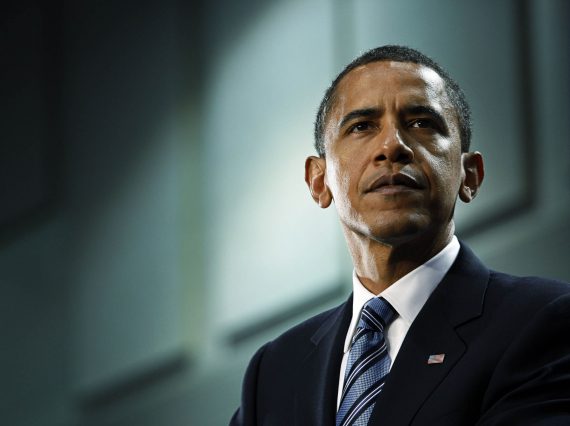

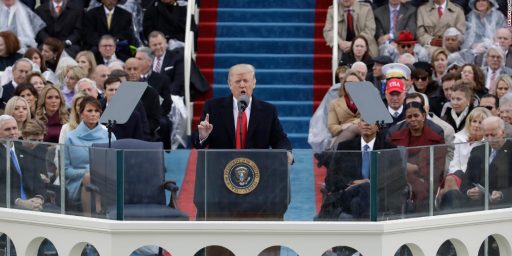
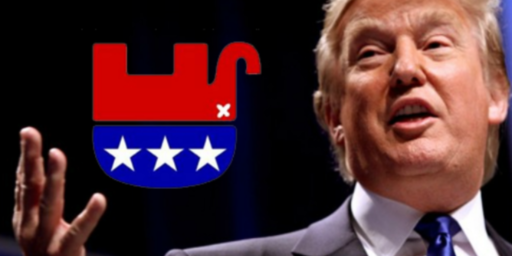
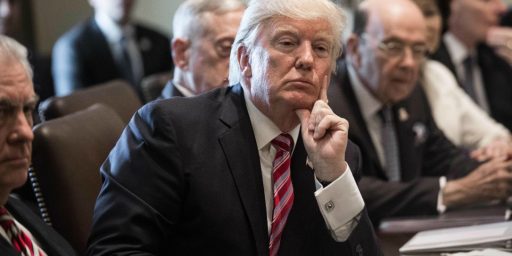
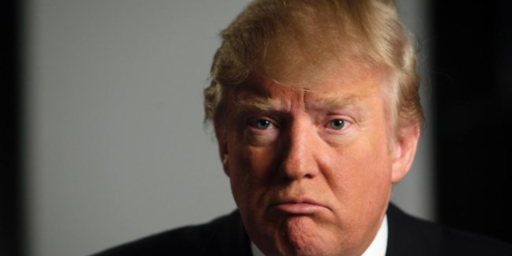
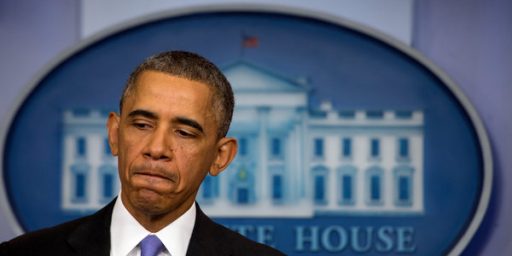
Also worth noting in the case of Carter and Bush is that they not only had a weak economy, but they were pitted against extremely charismatic candidates. Regardless of merit, I can’t think of any potential Republican nominee who can out charisma Obama, with the possible exception of Gary Johnson, who has about the same chance of getting the Republican nomination as I do.
Another factor to consider are the many many disenchanted Democrats who were Obama’s base , and have been sorely disappointed by his lurch to the corporate right. If they vote in 2012, it will be because Obama is the lesser of two evils at this point, unless he does a huge turnaround and recognizes the anti war, pro union, pro gay rights progressives and young people who put him in office in the first place. He needs to dump the blue dogs, and fast.
These polls are fairly meaningless except as a guide to the president’s underlying strength. Even at his worst he’s never fallen below the mid forties nationally and now he’s back around 50%. It obviously depends on the state of the economy and the underlying level of confidence with the man (would you trust him to look after your kids on holiday?). He’s going to have a huge war chest, the numerous Republicans will have ripped each other apart for months, the economy will be going gangbusters probably, and turnout will be 130,000 million not 82 million…what do think?
mtb says:
Wednesday, February 23, 2011 at 16:20
He hasn’t lurched to the corporate right. Sure he hasn’t nationalizd the banks, thrown Jamie Dimon in the slammer, banned BP from operating in the US, cancelled all credit card debt, set all the prisoners at Gitmo free, arrested Bush, waterboarded Cheney, but outside of those who are disappointed paradise has not yet arrived, the Democratic base loves him.
Another factor to consider are the many many disenchanted Democrats who were Obama’s base , and have been sorely disappointed by his lurch to the corporate right.
That’s a real small number. Democrats are, by and large, pretty satisfied with Obama’s performance. Excepting GWB, who was still riding his 9/11 wave, Obama has higher approval ratings from his party than either Reagan or Clinton did at this point in their first terms.
“It’s the economy, stupid.” Joe, I hope you’re right about the economy, but I’m not as optimistic as you. If it is 130 million, it will be because the economy did not come back and he will be toast.
The narrative works for Obama, as does his charisma. And the sheer nastiness of the GOP.
And he just got right on DOMA and did it at a time when the backlash from the right will work in his favor. The last thing he wants is a sane, rational GOP. He grows strong on their crazy.
My daughter’s Tae Kwon Do instructors do a little thing where they ask a kid to high-five them — and the kid misses. I’ve watched closely and I swear I never see the master’s hands move. And yet, they must.
That’s Obama to me. And it’s worth noting that he was a dojang rat himself.
Mantis and Joe, the democrat base doesn’t matter. Why do you use them as basis for predicting he would win? Do you think the middle will return to him? They sure didn’t last fall.
Mantis and Joe, the democrat base doesn’t matter. Why do you use them as basis for predicting he would win?
I didn’t. Any other stupid questions?
Do you think the middle will return to him? They sure didn’t last fall.
What was he running for, again?
“In an effort to see where things stand in that regard, Gallup has just released a state-by-state breakdown of the President’s job approval numbers and the picture looks grim but by no means un-winnable”
I’m guessing you mean “looks grim for the Republicans, but by no means” etc.
Mantis, please forgive me for being stupid. I’ll forgive you for being arrogant.
Mantis, please forgive me for being stupid
You’re forgiven.
I’ll forgive you for being arrogant.
Don’t care.
Pete says:
Wednesday, February 23, 2011 at 16:36
” but I’m not as optimistic as you. If it is 130 million, it will be because the economy did not come back and he will be toast.
I’ve spent the last year here pointing out the economy was in recovery mode, there would be no double dip, the Dow was going to break 12,000, inflation was under control, interest rates would remain depressed…So far I’ve been proved right…and 120 million+ turnouts are fairly normal in presidentials
Pete says:
Wednesday, February 23, 2011 at 16:39
“Mantis and Joe, the democrat base doesn’t matter. …..They sure didn’t last fall.”
I see the Republican base is unimportant too? The turnout in November was around 82 million versu 130 million in the presidential….That’s a 37% difference, nearly 50 voters, even the math challenged can understand that surely?…perhaps not?
Yeah, the historic reversals for Democrats at the national and state levels in 2010 don’t mean anything. Remember how the Republican Party was going the way of the dodo in early November 2008?
> Yeah, the historic reversals for Democrats at the national and state levels in 2010 don’t mean anything.
They mean the GOP has 2 years to hang themselves before the next election. They are already off to a damn good start, and things have pretty much gone Obama’s way since the midterms.
Back in ’08 I said Obama was toast in ’12 if the economy did not do a complete 180…
I am beginning to think I was wrong. A stagnant economy + a whole lot of mis-steps (WI anyone???) + an INCREDIBLY weak GOP field = an Obama victory.
“Yeah, the historic reversals for Democrats at the national and state levels in 2010 don’t mean anything. Remember how the Republican Party was going the way of the dodo in early November 2008?”
Charles, do you actually think the electorate is consistent???? You, me… we are consistent (or not) but the electorate is schizophrenic ……………..
“A stagnant economy”
Forecast growth this year is around 4%…Do you know what average GDP growth has been for the past 50 years? Obviously not.
Yeah, well that whole blank slate thing probably won’t work as well next time.
charles austin says:
Wednesday, February 23, 2011 at 19:04
“That’s a 37% difference, nearly 50 voters, even the math challenged can understand that surely?…perhaps not”
CA proves me right.
Your confused as to who said what, but that’s not too surprising.
Yeah, we’ve got the 2 million jobs created or saved.
I don’t trust government statistics much anymore anyway. I have my reasons.
>when it comes to running for re-election in 2012, what’s really going to matter to President Obama and his eventual opponent is, of course, the Electoral College.
Only if it’s a close race. If it is close, that’ll be a historical first: no president who reached the office with a landslide in the Electoral College, as Obama did in ’08, has ever faced a close reelection fight. Either they’ve won reelection handily, or been defeated handily (assuming they were nominated for reelection).
Let’s consider the 20th century onward. How many elections in which one of the nominees was an incumbent president were relatively narrow? Well, there was Woodrow Wilson and George W. Bush (both elected narrowly and reelected narrowly), and Truman and Ford (veeps who succeeded to the office and faced a tough fight for a second term). That’s it. All the other incumbent nominees either won a new term with a large electoral margin (TR, Coolidge, FDR, Ike, LBJ, Nixon, Reagan, and Clinton) or were defeated by a large electoral margin (Taft, Hoover, Carter, and Bush Sr).
So if history is a guide, it would seem likely that Obama will either win by a large electoral margin or lose by one. There seems to be a relationship between how well a president does the first time around and how well he does the second time. And it’s very rare for a president to win reelection with a smaller share of the electoral vote than he got the first time. Wilson and Madison are the only exceptions.
I suspect that by the time 2012 comes around, it will even out to a relatively conventional election: if the economy is doing badly, he’ll get his butt whipped, but if it’s at least marginally improving, he’ll have an easy time.
i was agree with this ..thank you.. http://www.directoryark.com/
@Brummagem Joe:
“He hasn’t lurched to the corporate right.”
If that’s true, it’s true because he started off as a corporatist. Thus no lurching.
“Sure he hasn’t nationalizd the banks, thrown Jamie Dimon in the slammer, banned BP from operating in the US, cancelled all credit card debt, set all the prisoners at Gitmo free, arrested Bush, waterboarded Cheney, but outside of those who are disappointed paradise has not yet arrived, the Democratic base loves him.”
How many of those things have actually been seriously advocated by…. anybody?
Meanwhile, he has expanded the abuse of executive authority, decreeing that he has the unchallengable right to assassinate American citizens. The left hated it when Bush did this sort of thing, but when Obama does it, then anybody who complains is “disappointed paradise has not yet arrived”. That’s not a consistent position. Clearly partisanship overcomes principles on both sides of the aisle.
Let’s cut to the chase here. If an article this long and this explanatory is needed to show that the president is in good shape for re-election, he’s not in good shape for re-election. As far as inflation goes, it’s low if you go by the government numbers which no longer factor in the price of food. Been to the grocery store lately? I have. From 1972 until 2009 I worked in food retail. (I lost my job in 2009, in part due to higher business taxes putting a pythonesque squeeze on my employer.) I guess if you don’t eat, inflation is just ducky.
I’ve been following presidential politics since 1964, and another remark above is worth a laugh – that the Republicans don’t have a candidate who can beat Obama. They have a number of them, and so do the Democrats. You just don’t know who they are, right now – but the election is not until November 2012. I know who one of the Republicans are, and I’ll just say it isn’t Governor Christie of New Jersey.
Enlighten us…
This is great. “The more evidence you give, the more I’ll refuse to believe it!”
That should be the motto of today’s Republican Party.
TG, you keep right on believing that. In fact, Obama has it so much “in the bag” in 2012 that I think you don’t even have to go vote.
Now, for the dose of reality. I work for one of the top pollsters in the country. We’re in touch with fellow pollsters, both Democrat and Republican, on a weekly basis. We all concur on the states that Obama cannot possibly win – this is based on current polls as well as the mid-term election results (and voter sentiment). Kick in how many states, especially swing states, are currently passing tough anti-voter fraud laws – this will make it even tougher on the Democrats. As it stands – and will stand through November 2012 – the GOP will states assuring over 270 electoral votes – and there’s a few more states we’re confident will go Republican.
The GOP candidate can expect to get somewhere in the range of 287 votes to 310 if the landslide is on and he/she takes Pennsylvania, which is a “very” possible.
Guy, you’re off your rocker if you think pollsters can say decisively who will or will not win. You can’t predict the future. It’s cute that you think so. People in your business are often wrong; see weathermen for a good example. The variables are too complex, and your information is laughably incomplete. A lot can change in 1-2 years. The most you can say is that if voter sentiment continues along its current trajectory, X is likely to happen with a margin of error of Y.
The midterms don’t/didn’t mean jack, really, and it’s obvious where your political loyalties lie with that comment. All it did was determine the makeup of Congress for the next couple years, which is significant, but not indicative of 2012. The turnout was 40.8%, and if you assume Republicans won a generous 60% of that, that’s only 24.48% of the country supporting them. Turnout is everything, and that will surge by a good 20% over the midterms, which I contend will favor Democrats.
Because of how many Democratic Senate seats are up for grabs in 2012 vs. Republican ones, it’s very likely they’ll lose control in 2012 unless something drastic happens or Republicans continue the trend of nominating Sharron Angles and Christine O’Donnells. Republicans aren’t likely to lose their House majority either, though they will probably see a net loss. In addition to all the other factors in play, do you think after Obama’s one 4-year term they’re going to be ready to hand the presidency back to the Republicans already? Total control over the government back to the Republicans this soon after the massive disaster of 8 years of Bush and 4 of those years with total Republican control? Right after their impatience with total Democratic control for 2 years?
Fifteen of twenty-two? I’d like to see that list. Since 1868, six incumbent Republicans have been re-elected: Grant, McKinley, Eisenhower, Nixon, Reagan, and G.W. Bush. Three incumbent Democrats – Wilson, Roosevelt, and Clinton – have turned the trick. That makes nine. Could he be counting incumbents who were elected on their own for the FIRST time instead of being “re-elected?”
Those elected incumbents who were denied re-election when attempted: Cleveland, Harrison, Taft, Hoover, Carter, and G.H.W. Bush.
Please post that list illustrating Huckabee’s point. I’d love to see it.
@lgbpop
I think Doug was including vice presidents who succeeded to the office and were later elected to a second term. So Coolidge, Truman, and LBJ would go on the list. He was also including FDR’s two extra terms. So here’s the full list:
Grant, McKinley, TR, Wilson, Coolidge, FDR, FDR, FDR, Truman, Ike, LBJ, Nixon, Reagan, Clinton, and Bush.
That’s 15.
As a side point, what Huck said was in fact inaccurate: he claimed that no incumbent since 1868 has been voted out of office except for Carter. Besides the obvious inaccuracy of that (how can he not remember Bush Sr.?) there’s the question of why he picked 1868 as the cutoff line. There was nothing special about that year, and the incumbent president (Andrew Johnson) wasn’t even on the ballot.
It is true, however, that Carter is the only incumbent president in the last 100 years to be from a newly elected party and to lose reelection. The other losing incumbents (Taft, Hoover, and Bush Sr.) were Republicans at the end of a period of 12-16 years of Republican rule. It is unusual for the public to vote a new party into the White House and change their mind just four years later. Perhaps that is what Huck was trying to say.
Call me picky, then. One is not being re-elected when one is being elected for the first time. Whichever way it’s sliced, though, that still has nothing to do with the incumbent. If complacency is a component of extending a president’s stay in the White House, Obama will have a bad time because his deliberate efforts to polarize the country have driven away thousands of voters. In my lifetime he’s the first president I’ve seen who’s been willing to ignore the people who didn’t vote for him. Trite as it sounded previously, preceding executives have been mindful that they are president of all the people and at least have tried to persuade or convince the skeptics. Obama treats them as if they’re simpletons not worth his time and belittles them openly. His willingness to stick his nose into intrastate issues will hurt him, too.
Another measure of the complacency factor is at what level does the incumbent first face opposition? Taft, Ford and Carter were doomed from the get-go in my opinion, since they faced active opposition from within their own party for the nomination before they even campaigned for the general election. I don’t see Obama getting through the primaries and caucuses without someone thinking he’s vulnerable. I doubt it’ll be Clinton, since Obama’s more useful to her as a stalking horse than as an opponent. Watch out for Jerry Brown and Andrew Cuomo, though.
>One is not being re-elected when one is being elected for the first time.
It’s a standard convention to use the word “reelection” for any incumbent president elected to a new term. The idea is that vice presidents who succeed to the office were still on a ticket that got elected, and in that sense their first election as president can still be called a reelection. Only Ford’s presidency defies this rationale, making the word “reelection” for what he sought in ’76 seem inappropriate. But this is merely a semantic quibble. Just replace the word “reelection” with “election to a new term,” and the point is the same.
>In my lifetime he’s the first president I’ve seen who’s been willing to ignore the people who didn’t vote for him.
You write well for someone born in 2009. 😉
Sorry, but that is silly. Replacing one word with another changes the meaning of a sentence – otherwise we wouldn’t have the marvelous variety of words in our language to express precisely what we want to impart. Among people I know and work with, it’s standard convention to mean what one says, and to say what one means. It is hardly semantics to speak accurately. Then again, I went to school in the 1960s when proper English was still taught in the schools.
Under no stretch of the imagination could one say in ANY sense that, say, Calvin Coolidge was re-elected in 1924 or Johnson re-elected 40 years later. They had the power of incumbency behind them, to be sure, but that’s about it. Indeed, despite their public recognition prior to being president a good argument could be made that without having incumbency, it would have been unlikely either man would have been ever elected president at all. The sad truth about the vice-presidential candidate is they rarely help the ticket to any great degree. Ronald Reagan found that out in 1976 when he announced his running mate would be Richard Schweiker, virtually his polar opposite philosophically – and did so before the convention in hopes of swaying some votes his way. I remember talking about it with a number of other delegates in Kansas City at the convention and as many people felt it hurt Reagan as helped him. Nixon, LBJ and Jack Garner were the only veep candidates to deliver the goods in the past 100 years.
Lastly, show me another president who has publicly belittled people as Obama does. I remember a few instances where protesters or malcontents were called to task, but not mainstream Americans. The man has yet to change over from campaign mode to executive.
Your being fooled by my youthful appearance made my day – thanks!
Please tell me what those schools called the inhabitants of the Americas before Europeans landed.
There’s no question that “accidental” presidencies differ in some ways from intended ones. The question is whether these differences affect Doug’s argument. To some extent, they do.
Doug said that 15 of the 22 incumbents since 1868 won reelection. I think his choice of 1868 as a cutoff line is arbitrary, and I think he was simply echoing Huck’s original, misinformed remark. But let that pass for now. If we remove the Coolidges and Trumans from the equation, the formula becomes as follows: of the 15 presidents since 1868 who were elected to the office and later nominated for a second term, 9 won reelection, whereas 6 lost. That looks quite a bit less impressive in demonstrating the advantages of incumbency. Instead of 15/22 = 68%, we have 9/15 = 60%, with a much smaller sample size.
It seems that accidental presidents have a greater chance of winning a second term than elected presidents do. In the 20th century, all four of the deaths in office gave us presidents who went on to win in their own right (TR, Coolidge, Truman, and LBJ). Only Ford, appointed as vp and succeeding to the presidency upon Nixon’s resignation, failed to win a second term. In the 19th century, there were four accidental presidents (Tyler, Fillmore, Johnson, and Arthur), but none of them were even nominated for a second term. You could make a decent argument that the conventional wisdom about the advantages of incumbency is skewed by all these examples.
The more salient point, though, is that presidents voted out of office have almost always been from the same party as the president who preceded them. In the last 100 years, only Carter defied this pattern. In all of our history, only two others did, the intertwined cases of Grover Cleveland and Benjamin Harrison. Cleveland, if you recall, lost reelection to Harrison despite winning the popular vote; four years later, he went on to win back the presidency, becoming the only president in history to serve two nonconsecutive terms. It was a pretty freakish set of electoral events, which may help explain why it defied the normal pattern.
Only Ford, appointed as vp and succeeding to the presidency upon Nixon’s resignation, failed to win a second term.
Humor me if need be, but Ford never won a first term – let alone a second. Getting past the accuracy of the concept, there’s a significant but unsung factor explaining the sudden popularity of incumbent accidental presidents and that’s the Seventeenth Amendment to the Constitution. Prior to 1913 the concept of federalism was alive and well, the States frequently thwarting the federal government through their legislative body – the Senate. Even if a bill made it through the people’s chamber (the House) it still had to run that second gauntlet in which the members were more attentive to the state legislatures that elected or appointed them. As such, the power of the federal government was far more constrained and thus the goodies the president could strew about to aid his election bid were fewer.
Once the Progressives got the Seventeenth Amendment passed and ratified, the States found their influence over the federal Government curtailed greatly. The Senate had become another house, many times acting as an echo chamber rather than an independent body. As the balance of power was tilted in the Feds’ favor, incumbents had more favors to bestow at election time. Another factor, obviously, was the personality of the incumbent in the 19th century presidencies – Tyler, Johnson and Fillmore were men of strong opinion and had no qualms about alienating legislators when they felt circumstances warranted. Arthur will remain an unknown, as he was willing to accept a nomination if offered but he didn’t seek it – he knew he suffered from a fatal kidney disease and didn’t want to be elected under the false pretense of good health. (He died 20 months after leaving office.) I believe my analysis to be valid, since Mataconis himself limited his example to presidential elections since 1868 – which was the first such election after the Civil War ended, and thus the first after the ascendance of the federal government above the states in terms of power under federalism.
Now, back to the original point – no matter the probabilities of an incumbent winning election, the odds are still the same every time – 50-50. As far as this goes…
I wouldn’t know what they called each other, and it has nothing to do with the question at hand. The Europeans called them Indians, obviously, as they thought they’d reached India and no one knew any different for quite a while afterwards. However, it was accurate as far as they knew.